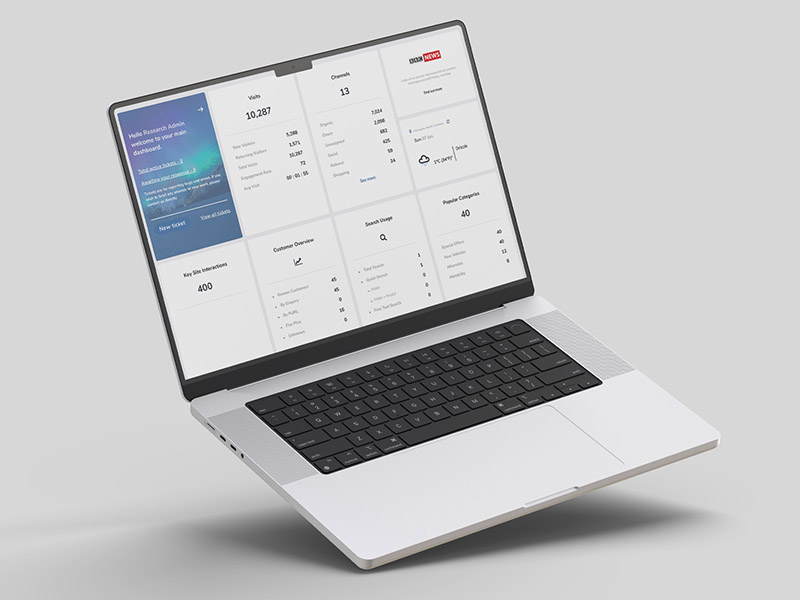The Power of Tailored Content: How Personalisation Boosts Conversions by as much as 20%

In today's digital age, consumers expect personalised experiences across the web. Businesses that deliver tailored content on their websites not only create better user experiences but also see significant improvements in engagement, loyalty, and, ultimately, conversions. This article will explore the virtues of personalised website content, discuss how it boosts conversion rates, and back up these claims with key research studies.
Why Personalised Content Matters
At its core, personalised content adapts a user’s website experience to their specific interests, behaviours, and preferences. Rather than delivering a generic experience, tailored content engages visitors by showing them what’s most relevant to them, making their journey through the site smoother and more intuitive.
Studies show that personalisation isn’t just a trend—it’s an expectation. A 2021 survey by McKinsey & Company found that 71% of consumers expect companies to deliver personalised interactions, and 76% get frustrated when this doesn’t happen. As a result, businesses that invest in personalisation can expect better customer retention, higher engagement, and a more seamless path to a conversion or purchase.
How Personalisation Improves Conversions
Personalised content influences conversion rates in several ways:
Relevant Product Recommendations: Personalised content leverages data like browsing history or previous purchases to suggest products or services that meet individual customer needs. According to Salesforce, 87% of consumers said relevant product recommendations increase their likelihood of making a purchase. Reminding a customer of a special offer they recently viewed in an intuitive non aggressive way is just one way to improve conversions, it’s like saying “Hey, remember this offer, it’s still on are you interested?”
Content Tailored to Purchase Stages: By understanding where users are in their buying journey, websites can deliver content that addresses their specific needs at each stage. For example, first-time visitors might benefit from nothing more than data collection, while returning customers may be shown special offers or retargeted ads. They might simply be “Welcomed Back” which is a clever way of reminding the returning visitor that they have been on this site before and is a friendly way to acknowledge that we remember them.
Personalised CTAs (Calls to Action): Tailored CTAs can lead to a dramatic boost in conversions. HubSpot found that personalised CTAs perform 202% better than default versions. Whether it’s based on location, device, or user preferences, a personalised call-to-action grabs attention and encourages action. Examples of a personalised CTA include: New Visitor CTA: “Learn More About Our Services” v Returning Visitor CTA: “Get a Special Offer on Your Next Purchase”. Simple but effective.
Enhanced User Experience (UX): Personalisation improves the overall user experience by reducing the number of irrelevant results or content. With a faster and more intuitive journey, customers are more likely to complete their goals on the website, whether that’s making a purchase, signing up for a newsletter, or booking a service.
Research Supporting Personalisation's Impact on Conversions
Several studies underline the positive impact of personalisation on conversion rates:
Evergage Study: A 2020 survey by Evergage (now Salesforce Interaction Studio) found that 93% of businesses using personalisation saw an uplift in conversion rates. These companies reported that personalisation enhanced the effectiveness of product recommendations, landing page content, and email campaigns.
Accenture Research: A study by Accenture revealed that 91% of consumers are more likely to shop with brands that recognise, remember, and offer them relevant recommendations and offers. The ability to tailor content based on personal data not only makes the shopping experience more enjoyable but also drives repeat business.
Boston Consulting Group (BCG): BCG’s research found that businesses that implement personalisation strategies at scale experience a revenue increase of 10% or more. They highlighted industries like retail, travel, and healthcare as seeing particularly strong results from personalisation efforts. And with CaboodleCode 2.0 you have literally endless possibilities to personalise you website.
Best Practices for Personalising Website Content
Leverage Customer Data: Collect and use customer data responsibly to create a more personalised experience. This includes browsing behaviour, location data, purchase history, and other analytics such as source of visit and also products viewed.
Create User Segments: Group your audience into meaningful segments based on factors like demographics, purchase behaviour, or engagement patterns, and deliver targeted content to each group.
Dynamic Content: Use dynamic content on your website to adapt what users see in real-time based on their actions. For example, show specific banners or products to first-time visitors, while presenting returning customers with loyalty rewards, products they have shortlisted or favourited or even personalised offers.
Conclusion
Tailored content is no longer just a luxury—it’s a necessity for businesses looking to thrive in a competitive online landscape. By personalising website experiences, brands can engage users on a deeper level, build stronger relationships, and drive higher conversions. Whether through personalised product recommendations, targeted CTAs, or dynamic content, businesses that invest in personalisation are better positioned to turn visitors into loyal customers. With numerous studies underscoring its effectiveness, personalisation is a proven strategy that delivers a tangible return on investment. In a world where consumers expect relevant, tailored experiences, businesses that fail to personalise risk being left behind.
References:
McKinsey & Company. (2021). Next in Personalization 2021 Report.
Salesforce. State of the Connected Customer (2021).
HubSpot. The Impact of Personalisation on CTAs (2020).
Evergage. 2020 Trends in Personalization Survey Report.
Accenture. Personalisation Pulse Check Report.
Boston Consulting Group. The Value of Personalization (2021).
Article written by Karl Rahmani Managing Director The Whole Caboodle
Interested in your own CaboodleCode AI website?
Get in touch today!
Please fill in your details below and let us know when you would like a demonstration of Online Car Events.
Got a question, a brief or a challenge you want to set, feel free to tell us.

